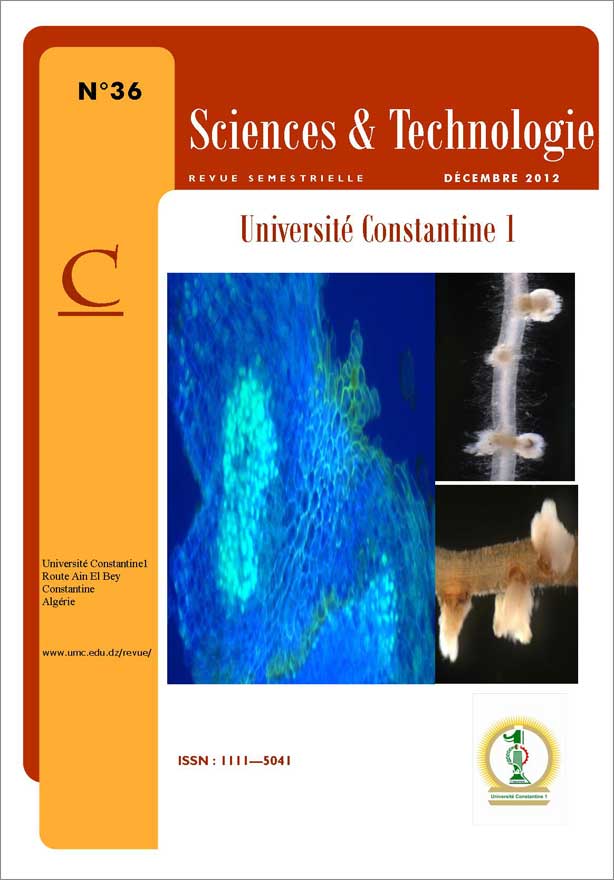EFFET DE LA DESHYDRATATION SUR LA DISTRIBUTION DES DYSTROPHINES ET DE SES PROTEINES ASSOCIEES AU NIVEAU DU LOBE NERVEUX HYPOPHYSAIRE DE RAT WISTAR
Mots-clés :
Dystrophines, Utrophines, Protéines asscoiées à la dystrophine (DAPs), Dystroglycanes, Sarcoglycanes, Déshydratation, Plasticité, Lobe nerveux hypophysaireRésumé
La dystrophine (Dp) est le produit du gène de la dystrophie musculaire de Duchenne (DMD). Nous nous sommes intéressés dans ce travail, à l’étude de l’expression et de la distribution des Dps, Ups, et les DAPs membranaires (β-DG, δ- et ε-sarcoglycane (SG)). Cette étude est réalisée au niveau des constituants du lobe nerveux hypophysaire (LN) de rat euhydraté et de rat déshydraté par 6 jours de privation d’eau. Les résultats obtenus ont montré l’expression des Dps, Ups, β-DG et pour la première fois les deux sarcoglycanes (δ- et ε-SG) dans les différents constituants du LN. De plus, ces protéines semblent avoir des distributions en complexes différents constitués soit par une association Dps-DAPs ou Ups-DAPs selon les types cellulaires et les niveaux subcellulaires. Ches les rats déshydratés, la distribution des dystrophines, utrophines et DAPs est modifiée. Ces résultats suggèrent que ces complexes protéiques auraient des rôles physiologiques distincts dans l’activité neurosécrétoire et sa régulation au niveau de ce système.Références
Bennet V. and Gilligan D.M., The spectrin-based membrane skeleton and micron-scale organisation of the plasma membrane. Annu. Rev. Cell. Biol., 9 : 27-66 (1993).
Takemitsu M., Ishiura S., Koga R., Kamakura K., Arahata K., Nonaka I and Sugita H., Dystrophin-related protein in the fetal and denervated skeletal muscle of normal and mdx mice. Biochem. Biophys. Res. Comm., 180 : 1179-1186 (1991).
Culligan K.G., Mackey A.J., Finn D.M., Maguire P.B. and Ohlendieck K., Role of dystrophin isoforms and associated proteins in muscular dystrophy. Int. J. Mol. Med., 2: 639-648 (1998).
Cohn R.D. and Campbell K.P., Molecular basis of muscular dystrophies. Muscle Nerve, 23 : 1456-1471 (2000).
Anderson J.L., Head S.I., Rae C. And Morly J.W., Brain function in Duchenne muscular dystrophy, Brain, 125: 4-13 (2002).
Blake D.J., Tinsley J.M., Davies K.E., Knight A.E., Winder S.J. and Kendrick-Jones J., Coiled-coil regions in the carboxy- terminal domains of dystrophin and related proteins: potentials for protein-protein interactions. Trends. Biochem. Sci., 20 : 133-135 (1995).
D'Souza V. N., Nguyen T. M., Morris G. E., Karges W., Pillers D. A., and Ray P. N., A novel dystrophin isoform is required for normal retinal electrophysiology.Hum. Mol. Genet., 4, 837–842 (1995).
Lidov, H. G., Selig, S., and Kunkel, L. M., Dp140: a novel 140 kDa CNS transcript from the dystrophin locus. Hum. Mol.Genet., 4, 329–335 (1995).
Byers, T. J., Lidov, H. G., and Kunkel, L. M., An alternative dystrophin transcript specific to peripheral nerve. Nat. Genet. 4, 77–81 (1993).
Lederfin D., Levy Z., Augier N., Mornet D., Morris G., Fuchs O., Yaffe D. and Nudel U., A 71-kilodalton protein is a major product of the Duchenne muscular dystrophy gene in brain and other nonmuscle tissues. Proc. Natl. Acad. Sci. USA 89: 5346–5350 (1992).
Blake D.J., Hawkes R., Benson M.A., and Beesley P.W., Different dystrophin-like complexes are expressed in neurons and glia. J. Cell Biol., 147: 645–658 (1999).
Jung D, Filliol D, Metz-Boutigue MH, Rendon A. Characterization and subcellular localization of the dystrophin-protein 71 (Dp71) from brain. Neuromuscul. Disord., 3 (5-6):515-8 (1993).
Dorbani-Mamine L., Stoeckel M.E., Jancsik V., Ayad G and Rendon A., Dystrophins in neurohypophysial lobe of normal and dehydrated rats: immunolocalisation and biochemical characterization. Neuroreport, 9 : 3583-3587 (1998).
Tweedle C.D. and Hatton G.I., Evidence for dynamic interactions between pituicytes and neurosecretory axons in the rat. Neuroscience 5: 661–667 (1980).
Theodosis D.T., Bonhomme R., Vitiello S., Rougon G., Poulain D. A., Cell surface expression of polysialic acid on NCAM is a prerequisite for activity-dependent morphological neuronal and glial plasticity. J. Neurosci., 19: 10228–10236 (1999).
Theodosis D.T., Poulain D. A., and Oliet S.H. R., Activity-Dependent Structural and Functional Plasticity of Astrocyte-Neuron Interactions, Physiol. Rev., 88: 983–1008 (2008).
Haydon PG, Carmignoto G., Astrocyte control of synaptic transmission and neurovascular coupling. Physiol Rev., 86: 1009–1031 (2006).
Burbach J. P. H., Luckman S. M., Murphy D., and Gainer H., Gene Regulation in the Magnocellular Hypothalamo- Neurohypophysial System, Physiol. Rev., 81 ( 3): 1197-1267 ( 2001).
Janscik V. And Hajos F., The demonstration of immunoreactive dystrophin and its developmental expression in perivascular astrocytes. Brain Res., 831: 200-205 (1999).
Fort P., Sene P., Pannicke T. ....... Kir4.1 and AQP4 associate with Dp71-and utrophin-DAPs complexes in specific and defined microdomains of Müller retinal cell membrane. Glia, 56: 596-610 (2008).
Fallon J.R., and Hall Z.W., Building synapses: agrin and dystroglycan stick together. TINS, 17: 469–473 (1994).
Tinsely J.M., Blake D.J., Zuellig R.A., and Davies K.E., Increasing complexity of the dystrophin-associated protein complex. Proc. Natl. Acad. Sci.USA. 91:8307–8310 (1994).
Campbell, K.P., Three muscular dystrophies: loss of cytoskeleton–extracellular matrix linkage. Cell. 80:675–679 (1995).
James M., Man N.thi, Wise C.J., Jones G.E., and Morris G.E., A utrophin-glycoprotein complex in membranes of adherent cultured cells. Cell Motil. Cytoskeleton. 33:163–174 (1996).
Hatton G.I., Perlmutter L.S., Salm A.K and Tweedle C.D., Dynamic neuronal-glial interactions in hypothalamus and pituitary : implications for control of hormone synthesis and release. Peptides, 5 : 121-138 (1984)
Tweedle C.D. and Hatton G.I., Morphological adaptability at neurosecretory axonal endings on the neurovascular contact zone of the rat neurohypophysis. Neurosciences, 20 : 641-246 (1987).
Hatton G.I., pituicytes, glia and control of terminal secretion. J. Exp. Biol., 139 : 67-69 (1988).
Murugaiyan P. and Salm A.K., Dehydration-induced proliferation of identified pituicytes in fully adult rats. Glia, 15 : 65-76 (1995).

